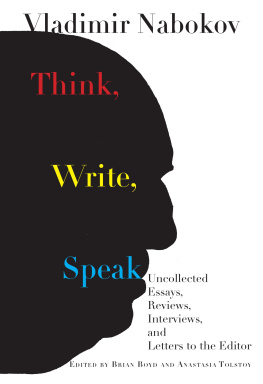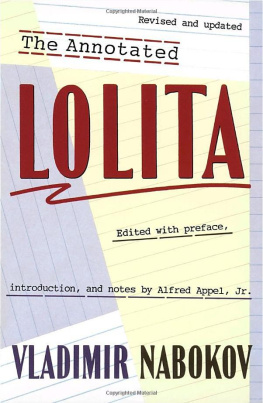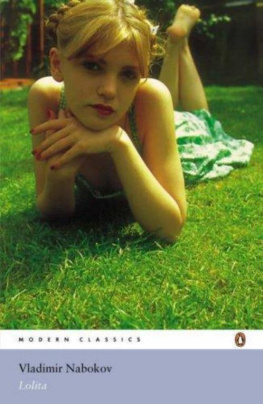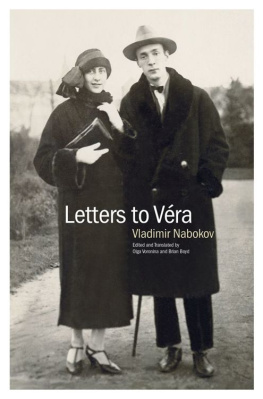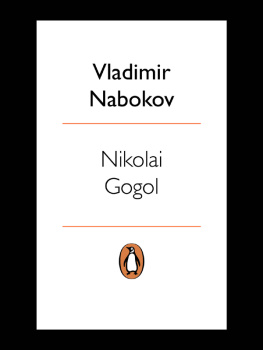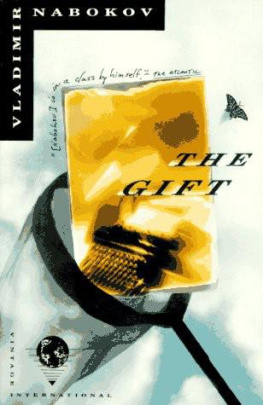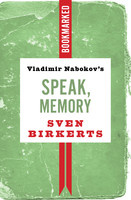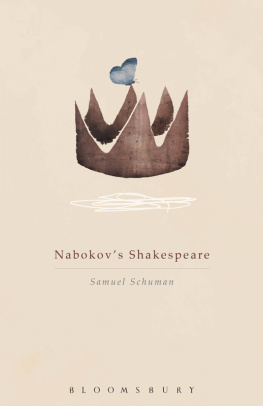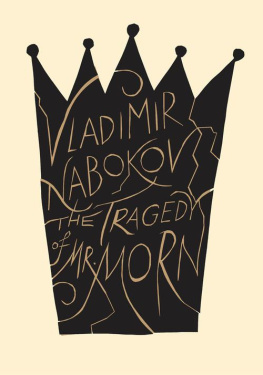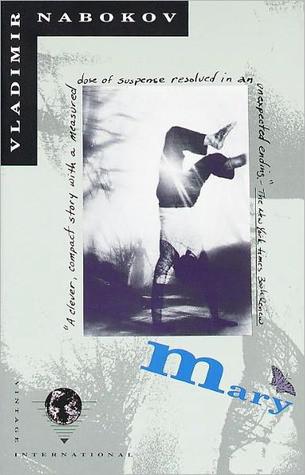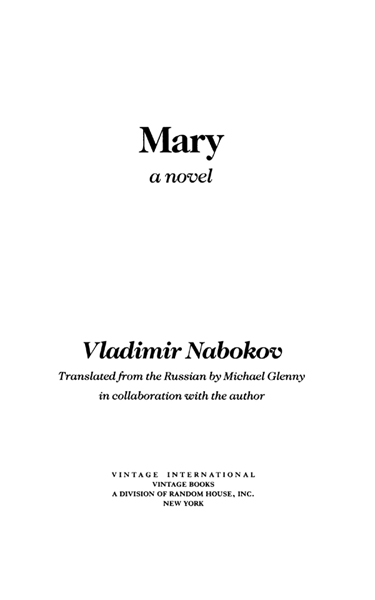BOOKS BY Vladimir Nabokov
NOVELS
Mary
King, Queen, Knave
The Defense
The Eye
Glory
Laughter in the Dark
Despair
Invitation to a Beheading
The Gift
The Real Life of Sebastian Knight
Bend Sinister
Lolita
Pnin
Pale Fire
Ada or Ardor: A Family Chronicle
Transparent Things
Look at the Harlequins!
SHORT FICTION
Nabokovs Dozen
A Russian Beauty and Other Stories
Tyrants Destroyed and Other Stories
Details of a Sunset and Other Stories
The Enchanter
DRAMA
The Waltz Invention
Lolita: A Screenplay
The Man from the USSR and Other Plays
AUTOBIOGRAPHY AND INTERVIEWS
Speak, Memory: An Autobiography Revisited
Strong Opinions
BIOGRAPHY AND CRITICISM
Nikolai Gogol
Lectures on Russian Literature
Lectures on Don Quixote
TRANSLATIONS
Three Russian Poets: Translations of Pushkin,
Lermontov, and Tiutchev
A Hero of Our Time (Mikhail Lermontov)
The Song of Igors Campaign (Anon.)
Eugene Onegin (Alexander Pushkin)
LETTERS
The Nabokov-Wilson Letters: Correspondence between
Vladimir Nabokov and Edmund Wilson, 19401971
Vladimir Nabokov: Selected Letters: 19401977
MISCELLANEOUS
Poems and Problems
The Annotated Lolita

First Vintage International Edition, November 1989
Copyright 1970 by Article 3C Trust
under the Will of Vladimir Nabokov
All rights reserved under International and Pan-American Copyright Conventions. Published in the United States by Vintage Books, a division of Random House, Inc., New York. Originally published, in hardcover, by McGraw-Hill Book Company, New York, in 1970. This edition published by arrangement with the Estate of Vladimir Nabokov.
Library of Congress Cataloging-in-Publication Data
Nabokov, Vladimir Vladimirovich, 18991977.
[Mashenka. English]
Mary : a novel / Vladimir Nabokov; translated from the Russian
by Michael Glenny in collaboration with the author.
1st Vintage international ed.
p. cm. (Vintage international)
Translation of: Mashenka.
eISBN: 978-0-307-78729-3
I. Title.
PG3476.N3M33 1989
891.7342-dc20
89-40119
Design by Leanne Shapton
Photograph by Alison Gootee
v3.1
To Vra
Having recalled intrigues of former years,
having recalled a former love.
Pushkin
Contents
introduction
The Russian title of the present novel, Mashenka, a secondary diminutive of Maria, defies rational transliteration (the accent is on the first syllable with the a pronounced as in ask and a palatalized n as in mignon). In casting around for a suitable substitute (Mariette?, May?) I settled for Mary, which seemed to match best the neutral simplicity of the Russian title name.
Mashenka was my first novel. I started working on it in Berlin, soon after my marriage in the spring of 1925. It was finished by the beginning of the following year and published by an migr book company (Slovo, Berlin, 1926). A German version, which I have not read, appeared a couple of years later (Ullstein, Berlin, 1928). Otherwise, it has remained untranslated for the impressive span of forty-five years.
The beginners well-known propensity for obtruding upon his own privacy, by introducing himself, or a vicar, into his first novel, owes less to the attraction of a ready theme than to the relief of getting rid of oneself, before going on to better things. It is one of the very few common rules I have accepted. Readers of my Speak, Memory (begun in the Nineteen-Forties) cannot fail to notice certain similarities between my recollections and Ganins. His Mary is a twin sister of my Tamara, the ancestral avenues are there, the Oredezh flows through both books, and the actual photograph of the Rozhestveno house as it is todaybeautifully reproduced on the cover of the Penguin edition (Speak, Memory, 1969)could well be a picture of the pillared porch in the Voskresensk of the novel. I had not consulted Mashenka when writing Chapter Twelve of the autobiography a quarter of a century later; and now that I have, I am fascinated by the fact that despite the superimposed inventions (such as the fight with the village rowdy or the tryst in the anonymous town among the glowworms) a headier extract of personal reality is contained in the romantization than in the autobiographers scrupulously faithful account. At first I wondered how that could be, how the thrill and the perfume could have survived the exigency of the plot and the ostentation of fictional characters (two of them even appear, very awkwardly, in Marys letters), especially as I could not believe that a stylish imitation should be able to vie with plain truth. But the explanation is really quite simple: in terms of years, Ganin was three times closer to his past than I was to mine in Speak, Memory.
Because of the unusual remoteness of Russia, and because of nostalgias remaining throughout ones life an insane companion, with whose heartrending oddities one is accustomed to put up in public, I feel no embarrassment in confessing to the sentimental stab of my attachment to my first book. Its flaws, the artifacts of innocence and inexperience, which any criticule could tabulate with jocose ease, are compensated for me (the sole judge in this case and court) by the presence of several scenes (convalescence, barn concert, boat ride) which, had I thought of it, should have been transported virtually intact into the later work. In those circumstances, I realized as soon as my collaboration with Mr. Glenny started that our translation should be as faithful to the text as I would have insisted on its being had that text not been mine. Revampments of the lighthearted and highhanded order that I used for the English version of, say, King, Queen, Knave could not be envisaged here. The only adjustments I deemed necessary are limited to brief utilitarian phrases in three or four passages alluding to routine Russian matters (obvious to fellow-migrs but incomprehensible to foreign readers) and to the switch of seasonal dates in Ganins Julian Calendar to those of the Gregorian style in general use (e.g., his end of July is our second week of August, etc.).
I must close this preface with the following injunctions. As I said in reply to one of Allene Talmeys questions in a Vogue interview (1970), The best part of a writers biography is not the record of his adventures but the story of his style. Only in that light can one properly assess the relationship, if any, between my first heroine and my recent Ada. I can as well say that there is none. The other remark concerns a bogus creed which is still being boosted in some quarters. Although an ass might argue that orange is the oneiric anagram of organe, I would not advise members of the Viennese delegation to lose precious time analyzing Klaras dream at the end of Chapter Four in the present book.


